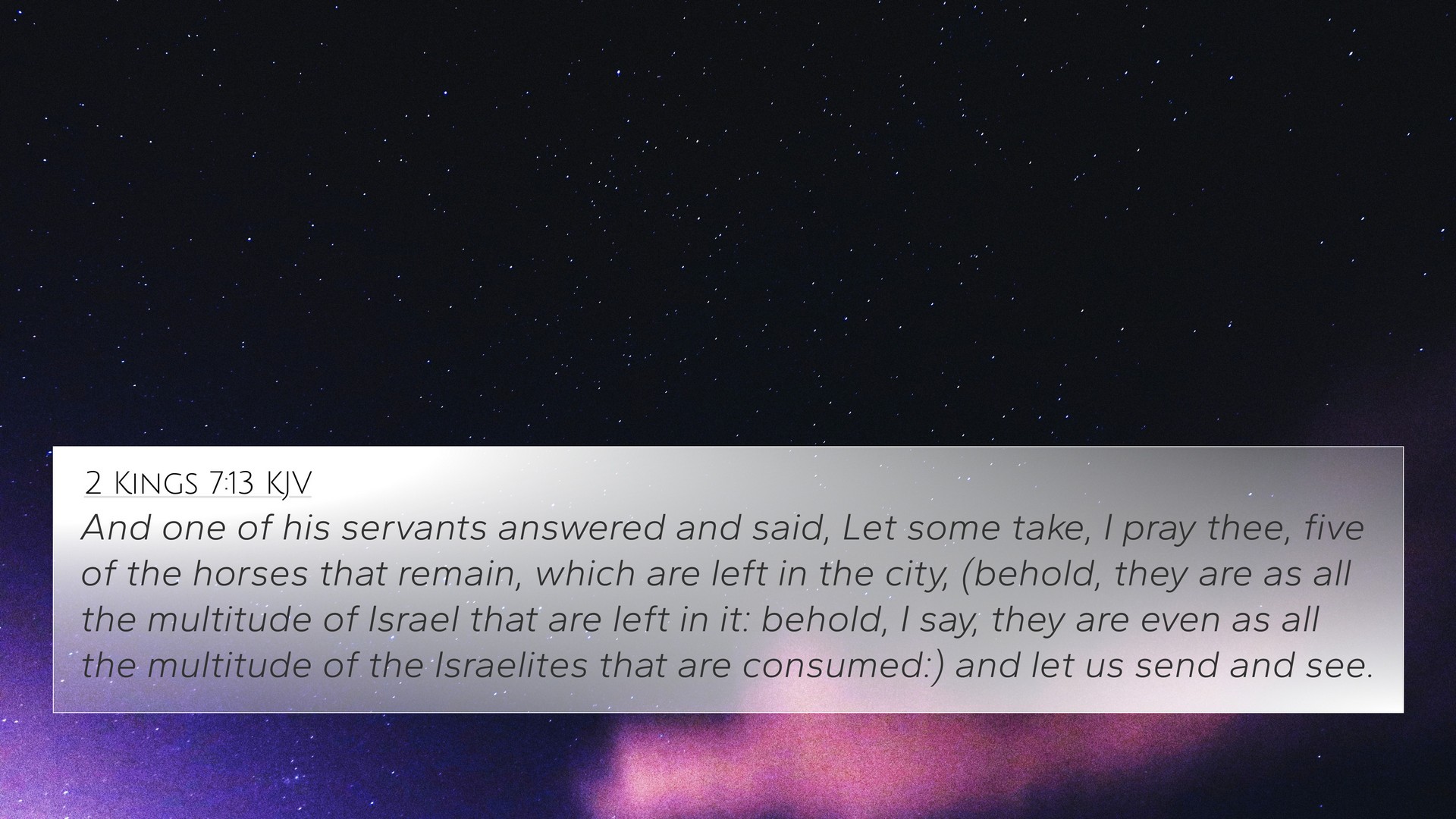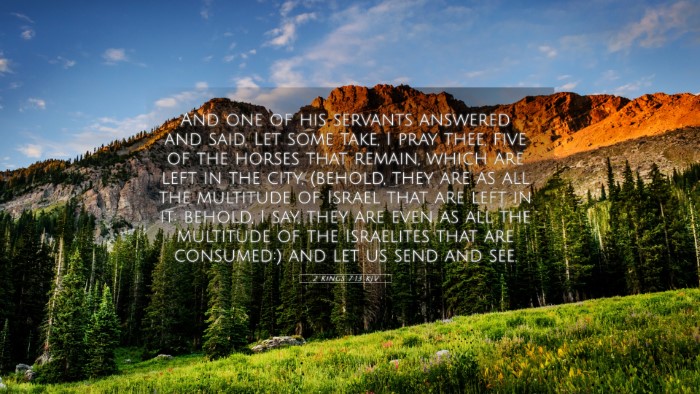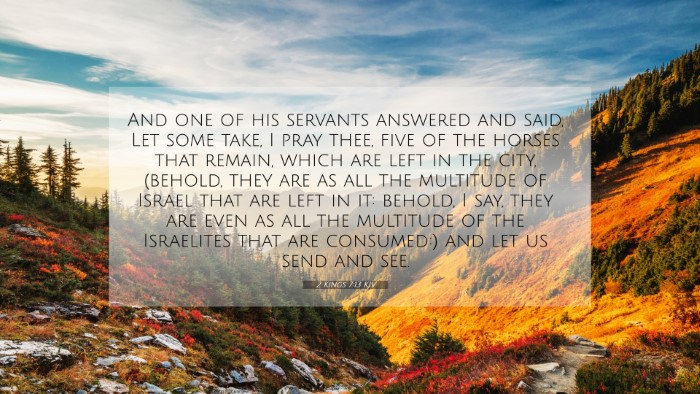Old Testament
Genesis Exodus Leviticus Numbers Deuteronomy Joshua Judges Ruth 1 Samuel 2 Samuel 1 Kings 2 Kings 1 Chronicles 2 Chronicles Ezra Nehemiah Esther Job Psalms Proverbs Ecclesiastes Song of Solomon Isaiah Jeremiah Lamentations Ezekiel Daniel Hosea Joel Amos Obadiah Jonah Micah Nahum Habakkuk Zephaniah Haggai Zechariah Malachi2 Kings 7:13 Similar Verses
2 Kings 7:13 Cross References
And one of his servants answered and said, Let some take, I pray thee, five of the horses that remain, which are left in the city, (behold, they are as all the multitude of Israel that are left in it: behold, I say, they are even as all the multitude of the Israelites that are consumed:) and let us send and see.
Uncover the Rich Themes and Topics of This Bible Verse
Listed below are the Bible themes associated with 2 Kings 7:13. We invite you to explore each theme to gain deeper insights into the Scriptures.
2 Kings 7:13 Cross Reference Verses
This section features a detailed cross-reference designed to enrich your understanding of the Scriptures. Below, you will find carefully selected verses that echo the themes and teachings related to 2 Kings 7:13 KJV. Click on any image to explore detailed analyses of related Bible verses and uncover deeper theological insights.
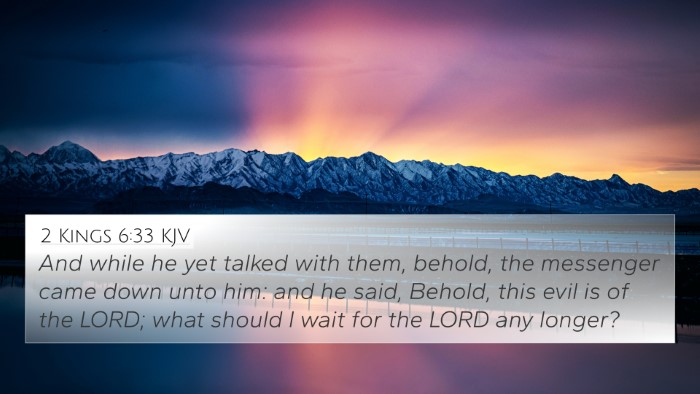
2 Kings 6:33 (KJV) »
And while he yet talked with them, behold, the messenger came down unto him: and he said, Behold, this evil is of the LORD; what should I wait for the LORD any longer?
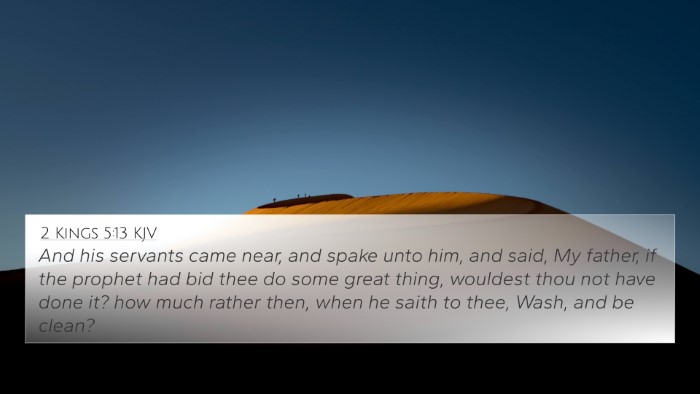
2 Kings 5:13 (KJV) »
And his servants came near, and spake unto him, and said, My father, if the prophet had bid thee do some great thing, wouldest thou not have done it? how much rather then, when he saith to thee, Wash, and be clean?
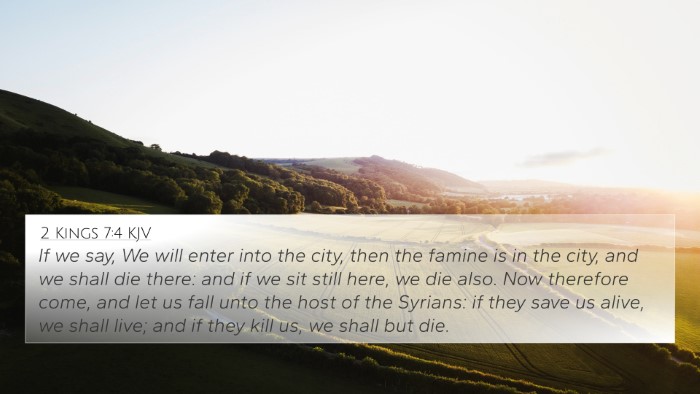
2 Kings 7:4 (KJV) »
If we say, We will enter into the city, then the famine is in the city, and we shall die there: and if we sit still here, we die also. Now therefore come, and let us fall unto the host of the Syrians: if they save us alive, we shall live; and if they kill us, we shall but die.

Jeremiah 14:18 (KJV) »
If I go forth into the field, then behold the slain with the sword! and if I enter into the city, then behold them that are sick with famine! yea, both the prophet and the priest go about into a land that they know not.
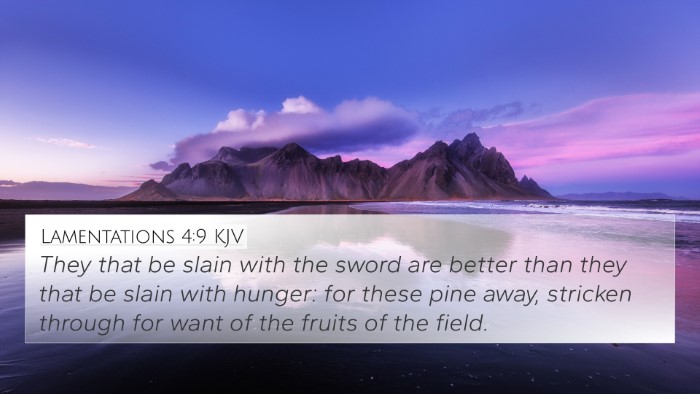
Lamentations 4:9 (KJV) »
They that be slain with the sword are better than they that be slain with hunger: for these pine away, stricken through for want of the fruits of the field.
2 Kings 7:13 Verse Analysis and Similar Verses
Understanding 2 Kings 7:13
Bible Verse: 2 Kings 7:13 states: "And one of his servants answered and said, Let some take, I pray thee, five of the horses that remain, which are left in the city; behold, they are as all the multitude of Israel that are left in it: behold, I say, they are even as all the multitude of the Israelites that are consumed: and let us send and see."
Meaning and Interpretation
This verse occurs in a context where the city of Samaria is suffering from a severe famine, and the people are in despair. The options present themselves among those who remain in the city. The suggestion made by one of the king’s servants provides significant insight into the desperation of the time, demonstrating the willingness to take risks to find out about the hostile forces surrounding them.
Insights from Commentaries
-
Matthew Henry:
Henry remarks on the importance of human agency and common sense in dire circumstances. The servant proposes to take some horses left in the city, drawing a comparison to the desperate situation faced by the Israelites.
-
Albert Barnes:
Barnes focuses on the notion that the few horses left are likened to those that are completely consumed. The urgency to act despite the bleak reality reflects the underlying hope amidst hopelessness. The proposal signals an attempt to gather intelligence about their surroundings.
-
Adam Clarke:
Clarke elaborates on the futility demonstrated in the proposed action, suggesting that these horses would serve no real purpose. Nonetheless, the action symbolizes the human desire to hold onto anything possible, even when the outcomes seem grim.
Cross-References
This verse connects to several other parts of Scripture, emphasizing themes of desperation, hope, and divine intervention. Here are some relevant cross-references:
- 2 Kings 6:24-30: The narrative of famine and tragedy in Samaria.
- 1 Samuel 14:6: Jonathan’s daring approach against the Philistines that showcases faith amidst fear.
- Ezra 8:22: A plea for God's protection in a perilous situation, indicating the fragility of hope.
- Matthew 10:29: Jesus speaks of God's care even for sparrows, drawing parallels to the stewardship of life.
- Psalms 34:19: Assurance that the righteous will face many troubles, yet the Lord will deliver them.
- Isaiah 41:10: God promises His presence and help during times of fear and uncertainty.
- Romans 8:31: Highlighting that if God is for us, who can be against us—offering hope even in desperate times.
Searching for Connections
Exploring bible verse cross-references can reveal deeper insights into 2 Kings 7:13. Understanding how different scriptures relate to each other enhances our grasp of Biblical themes and encourages a comprehensive bible cross-reference study.
Tools for Cross-Referencing
Utilizing a bible concordance can serve as a fundamental tool for discovering interconnections between various verses. It provides a systematic way to trace themes and subjects across the Scriptures.
Cross-Referencing Methodology
Engaging in cross-referencing Bible study methods aids in uncovering layers of meaning in each verse. Identifying connections not only between the Old and New Testaments but also thematic parallels enriches our study.
Conclusion
2 Kings 7:13 serves as a poignant reminder of the human spirit's resilience in crisis and the vital importance of seeking knowledge and understanding amidst despair. By engaging with bible verse parallels and thematic connections, believers can gain profound insights that foster faith and understanding.
Further Study Recommendations
For those interested in delving deeper into Biblical connections, consider exploring:
- Thematic studies comparing suffering and deliverance.
- Cross-referencing Psalms with New Testament teachings to enhance understanding of God's faithfulness.
- Identifying similarities and differences between the prophetic messages in the Old Testament and apostolic letters in the New Testament.
By engaging in these studies, we not only enrich our understanding of individual verses but also the overarching narrative of the Bible itself.
